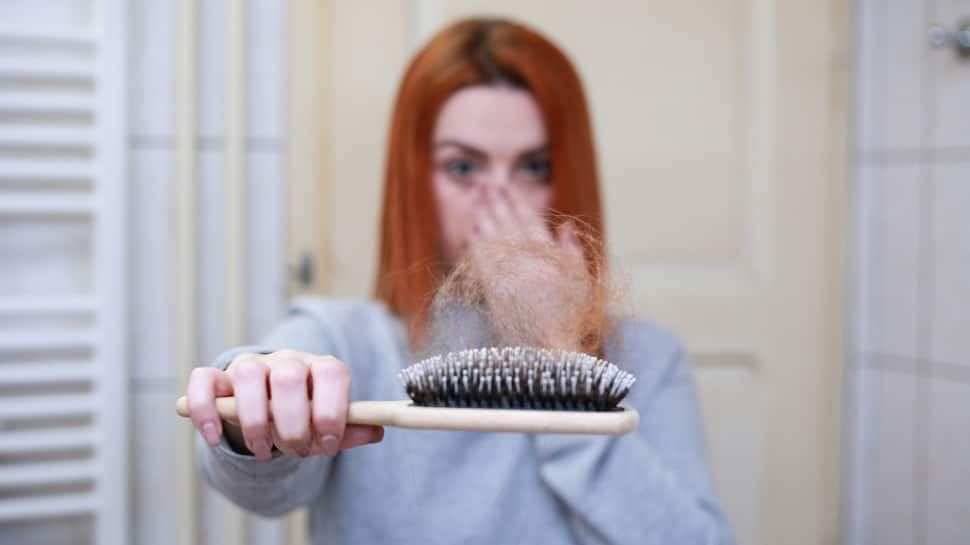EXCLUSIVE: Will Smith's wife Jada suffers from Alopecia Areata: Know all about the auto-immune disease
Alopecia Areata is an auto-immune condition in which a person experiences sudden hair loss that starts with one or more circular bald patches that may overlap.
Trending Photos
)
New Delhi: At the 94th Academy Awards, people were taken aback when actor Will Smith smacked ceremony host Chris Rock for making fun of his wife Jada Pinkett Smith’s bald head. Jada is suffering from an auto-immune disease called ‘Alopecia Areata’ that causes hair fall. After the controversy, people are debating whether it is okay to make fun of someone’s medical condition or is it fine to react and resort to violence to put across the point. While we are of the opinion that both making fun of someone’s illness and resorting to violence are not okay, the important takeaway should be to raise awareness and sensitivity about the disease ‘Alopecia Areata’.
What is Alopecia Areata?
Alopecia Areata is an auto-immune condition in which a person experiences sudden hair loss that starts with one or more circular bald patches that may overlap. In this disease, a person’s body starts attacking its own hair follicles (where the hair grows), which can cause hair loss anywhere on the body. Dr Kanu Verma, Dermatologist. Aakash Healthcare Super Speciality Hospital, reveals that it is a “non contagious , non communicable condition , which means it doesn't spread by touching or staying together”.

Who can get Alopecia Areata?
Alopecia Aerata can affect anyone. Men and Women get it equally and it affects all racial and ethnic groups. Dr Verma says, “The onset can be at any age; however, most people develop it during childhood or their teenage years.About half of them get their hair regrow even without treatment. When the hair regrows, it may never fall out again. However it's possible to have unpredictable cycles of hair loss and regrowth for years”.
Symptoms of Alopecia Areata
The most prominent symptom of alopecia is patchy hair loss. Coin shape hair loss patches appear. There may be itching or burning in the area before hair loss.
“The hair follicles are not destroyed and so hair can regrow if the inflammation of the hair follicles subsides. Sometimes fingernails and toenails may also be affected, and sometimes these changes are the first sight,” says Dr Verma.
Types of Alopecia Areata
Hair loss can be categorised into three categories:
Patchy: In this condition, hair loss occurs in patches instead of complete loss.
Totalis: Almost complete loss of hair
Universalis: This is a very rare kind in which the scalp, face, and rest of the body lose all of their hair.
What are some food items to eat and avoid if you suffer from alopecia areata?
“The diet prescribed for Alopecia Areata largely includes a diet rich in vitamins, calcium, zinc, and proteins. Including antioxidants from fruits and vegetables also has immense benefits,” explains Dr Kiran Godse, Dermatology and Cosmetology, Hiranandani Hospital, Vashi-A Fortis Network.
What is the medical treatment for alopecia areata?
“There is currently no cure for Alopecia Areata as it is an autoimmune condition. However, there are few other hair regrowth options. Corticosteroids and anti-inflammatory medicine that suppress the immune system of the affected person, are the most usually recommended treatment for the illness. They can be given through local injection, topical cream form or orally. Other medications are supportive in the form of hair vitamin tablets and some hair serums.. recently the role of PRP(Platelet rich plasma ) has been documented. Despite the fact that certain medicines help with hair regrowth, the person will continue to have random patches of hair loss,” explains Dr Verma.
How can we overcome the stigma in women related to hair falls due to diseases?
It is essential to understand that Alopecia Areata is not a contagious condition and can affect any person, which is why awareness of the situation is critical. In many cases, the disease can be repaired with treatment plans and can help the patient get back their old confidence.
Dr Godse shares some ways to reduce the stigma related to ‘Alopecia Areata’:
• Understand the condition by visiting a doctor and specialists
• Follow the treatment plan advised by doctors/healthcare team
• Visit a mental health expert if the stress and stigma makes it difficult for you to adapt to the condition. This is extremely important as hair fall can dramatically affect a person's confidence, and it is essential to tackle this aspect of the situation
• Ensure a good diet and lifestyle choices so that hair growth remains good for as long as possible
• Invest in hair care products - there are many hair loss products today, from those that hide the symptoms to those that reduce the root causes. These can be effective solutions to prevent hair loss and ensure sustained hair growth over a long period
Stay informed on all the latest news, real-time breaking news updates, and follow all the important headlines in india news and world News on Zee News.
Live Tv







)
)
)
)
)
)
)
)
)
)
